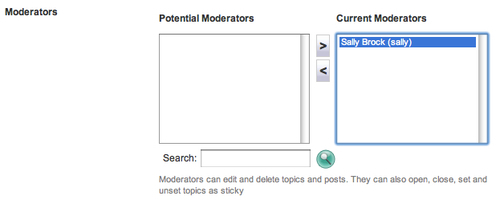Let's create a forum for your group:
- From the Group homepage page, click on the Forums tab.
- To start with, you will see that you already have the General Discussion forum in your group, but start by making your own new forum by clicking on the New forum button:

- The Add forum page will now open. Give your forum a relevant title.
- Then fill in the Description section by giving a simple explanation of what the forum will be used for.
- Next, choose how you would like topics in your forum to be expanded. You can select Fully expand, Expand to max, or No indents. Janet has decided to leave it set to the default — Fully expand. These options will be discussed later in this chapter.
- You will also see a link that says Settings, click on it. This shows a group of options for your forum. The first option is an option to automatically subscribe users. If this is set to Yes, all group members will start receiving e-mail updates about this forum. Janet wants her users to decide for themselves if they would like to subscribe, so left it set to No.
- Choose how you would like to order your forum compared to the other forums in the group by using the radio buttons. Janet thinks that the discussion forum should always remain at the top and so selected the button below that:

- There is also an option to add moderators for the forum. Moderators are non-admin members who you have confidence in to edit and delete other peoples' topics or posts. Janet has decided that she would like to have one moderator called Sally Brock who is the head of the Clinical Trials steering group. To make someone a moderator, simply click on his/her name under the Potential Moderators section and click on the right arrow. You will now see him/her listed under Current Moderators:

- Finally, there are a couple of other options available. You can decide who can create topics. With this, you can limit creating topics to just moderators and admins. Under this scheme, members are still able to respond and reply to the created topics. You can also choose to close new topics for standard members, so that only admins and moderators can reply.
- Click on the Save button to finish. You will see a screen similar to this showing your newly created forum:

You just saw how easy it is to create your first group forum.
The Mahara forums are as good as any you will find on the Internet — so take advantage of the feature. Think about discussions you have at the moment that require meeting up in a physical location and consider making an online Mahara forum for them, so that you can chat at distance. Why spend hours talking in face-to-face meetings? You could get all the serious discussion done before you turn up to a meeting, cutting down meeting time to focus on making the decisions, and socializing with each other a bit more. Why not use the online forums to debate issues and meet face-to-face to make decisions.
The other great thing about Mahara forums is that they can serve as a permanent online record of thought. Often, people tend to craft their thinking more carefully when they put their thoughts into writing than they do when they are speaking aloud. Users can go back again and again to revisit carefully-crafted comments that were made a long time ago but which may still be useful today.
With group forums, you are able to keep the discussions in relevant and controlled areas. You can decide who does and doesn't see the forum, and who you would like to administer or moderate it.
You were also introduced to the concept of a forum moderator. Let's have a look at this in more detail.
It may be important to you that your group forums are moderated. In a Mahara group, a forum can be edited by group administrators and forum moderators.
Moderators have the ability to edit and delete forum posts to remove any posts that may break the house rules or that are irrelevant to a discussion and require moving elsewhere. Mahara moderators also have the ability to respond to closed topics to which standard members cannot reply.
By forum moderation, we mean the allocation of a few special people to actively make the discussions happen. A moderator will generally conduct the following phases of a forum:
- Clearly presenting the topic up for discussion
- Engaging participants
- Managing the discussion process by linking the thought threads, widening out the topic, engaging responses from the more passive, and so on
- Ending the discussion when appropriate — perhaps with personalized feedback to some of the participants and a generic discussion summary or conclusion for the benefit of all
Not all forums have to follow the framework suggested in the preceding list, of course. Many forums are more open-ended in nature and many can be much more passively moderated.
Another responsibility of a forum moderator is to ensure that people are behaving themselves. What is exactly meant by behaving yourself is entirely up to you. Typically, a forum moderator should establish a set of ground rules for what is and isn't the acceptable behavior. Common rules might include the exclusion of abusive language, or a negative attitude to other people's postings.
Once the ground rules are established, it is a good idea for a moderator to make them clear and available to forum members. Perhaps they could include a link to the code of conduct in the forum description. This way the users will know the ground rules before they even start posting.
It is a good idea to replicate forum moderation standards across the entire Mahara site. Your Mahara site administrator may even have set up a code of practice for forum contribution as an element on your site's Terms and Conditions page. The important point is that you should be seeking to develop community standards from the onset, which become the culture for how people behave.
These extracts from a classic article called netiquette by Gary Alexander get you thinking about how people should expect to behave in forum settings:
http://sustainability.open.ac.uk/gary/netique.htm
Moderators should also try to be active in discussions. Here are a few things you could do as a moderator:
- Encourage users to send requests to you for how the forum should operate.
- Reply to threads, giving useful information.
- Take time to listen to people, praising good postings or topics with useful information.
- Be diplomatic with users who aren't following guidelines. Message them privately, not publicly. Usually a polite request to tone down their behavior will do the job.
- Be the most obsessive user of the forum. Be interested in the discussion. Spark discussion yourself.
In the preceding Time for action — creating a forum section, you also saw that you are able to select how you would like the topics in your forum to be expanded. Let's have a look at the difference between the three types of expansion on offer.
- Fully expand: Under this scheme, the topics in your forum will keep indenting to the right as more replies are added. Here is what the full expansion looks like:

- Expand to max: This is similar to the previous option in which the topics' responses automatically expand to the right, but this time you are able to choose a maximum level of expansion. This is really useful because when the Fully expand option is set and there are lots of replies in the forum, things can begin to look a bit messy. The following screenshot shows the expansion to the first level only:

- No indents: After the first topic, there are no indentations or expansion levels.
Now, going back to the forum page you will see there are a few options for managing your new forum. You will briefly look at these now.
You may want to edit your forum after some time. To do this, simply use the pencil Edit button next to the forum. You will see all the same options that you were presented with when you created the forum.
You may also want to delete the forum. Perhaps you realize that nobody is engaging in discussion with that particular forum and it doesn't matter if you delete it because there aren't many topics or it is no longer in use. To do this, click on the small cross button to delete the forum. You will get a message prompting you to confirm the action.
Finally, you are able to subscribe to forums (if you have decided to subscribe to all forums, you won't have this option as you are already subscribed). Subscription is just like subscribing to a weekly magazine. Instead of receiving mail through your front door, you will get live Mahara notifications giving you details of new forum posts that are added. Click on Subscribe to do this:

If you want to stop receiving notifications of forum posts, click on Unsubscribe:

If you are subscribed to a lot of forums in groups, your e-mail inbox can soon pile up with lots of messages from forum posts. We recommend that you switch to using a daily digest for your e-mail notifications to prevent this from happening. This way you get a short daily summary of forum activity rather than a separate e-mail for each update. See Chapter 2, Getting Started with Mahara for more information on how to set this up.
